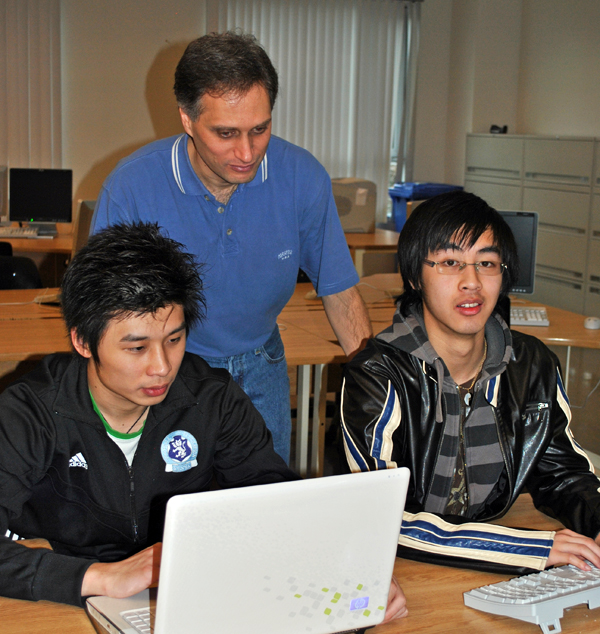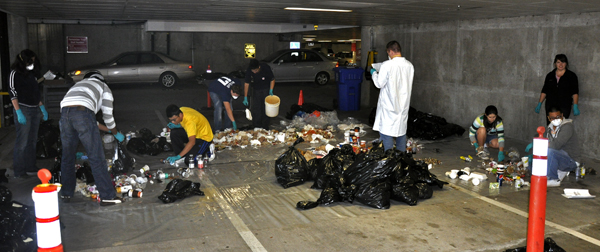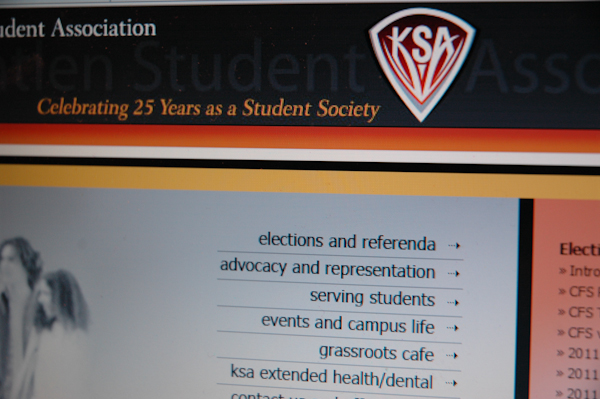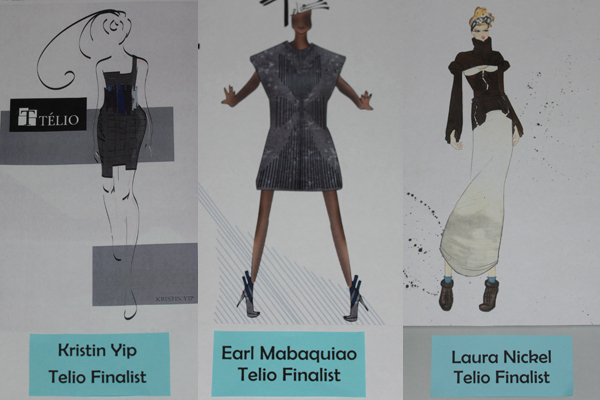2011 KSA elections first-ever online only vote
January 25, 2011 by Jeff Groat · Leave a Comment
When the polls close at noon on Feb. 6, this year’s KSA elections will be the first to have been conducted exclusively online.
Unlike previous elections, which occurred only on one day and involved physical ballot boxes and voting booths, voting will be conducted online from noon on Jan. 31 to noon on Feb. 6.
But there are concerns among KSA Executive Board members that the door for breaking the rules is wide open.
KSA Director of Academic Affairs, Brad Head, sees problems with the online voting system, predicting a lower voter turnout. “Many students don’t vote already… many students don’t go onto their myKwantlen account,” he said.
Head is also concerned about cheating.
Since voting traditionally took place at stationary voting booths in years past, computers that will now be used for voting are required to be “stationary.” In other words, candidates are barred from simply walking around campus with a laptop and asking people to vote.
KSA Director of Finance, Shanal Prasad, has similar concerns.
“There is so much potential for things to go wrong,” he said. “What if a group of people have a giant party and they have a laptop there and they get all their friends to come and vote?”
KSA Director of External Affairs, Matt Todd, said it’s also against the rules for a candidate to walk around and offer candy bars in exchange for votes, something that was just as likely under the paper-balloting system.
“We already live with that risk, we just have different packaging on the risk,” Todd said.
(The distribution of food and drink is a violation listed in KSA elections Regulations document on their website and candidates are held responsible for the actions of supporters. According to KSA regulations, “the candidate accepts full responsibility… that any offenses committed by campaigners shall be deemed to be offences committed by the candidate.”)
As for benefits, Todd said it is much cheaper to put the vote online. And because it is cheaper, it is possible to run the election over more days and, he hopes, capture more voters. As well, there are no “bad ballots” online, and tabulation of votes is automatic.
This year, there are 59 candidates running for various positions in the KSA. This is the largest number of candidates to have run in a single election at Kwantlen. “It means people are paying attention and actually care enough to participate,” Todd said.
Here is a full list of candidates (link is to a PDF.)
Kwantlen plans first-ever student trip to Ghana
January 17, 2011 by Max Hirtz · Leave a Comment
For the first time in its history, Kwantlen has organized a three-week field school in Ghana for any students who are interested and meet course requirements.
Charles Quist-Adade, the Kwantlen sociology professor responsible for organizing the trip, was born in Ghana and has an intimate knowledge of its culture.
He described Ghana as the most hospitable nation in Africa, noting that Ghanaians are generally friendly toward foreigners.
Quist-Adade believes that students learn by doing and prefers to see his students out of the classroom doing research that will “bring about change in the lives of real people.”
Applicants must be over the age of 19, have completed 45 credits and have a good student standing at the school they attend. They do not, however, need to be Kwantlen students.
The students will depart for Ghana on June 29 and will head home July 25. Before they leave, they will spend time preparing in the classroom.
For part of their trip, students will have the opportunity to work with non-government organizations that build homes for poor people and deliver health care to those in need.
They will also attend lectures by professors from the University of Ghana and the Ghana Institute of Journalism about the politics, history, culture and economy of the country.
Whatever time is left will be spent sightseeing, dancing and soaking up the Ghanaian culture.
“When we come back, they will organize a colloquium where they will share their experiences with the Kwantlen community, plus, of course, the wider African communities in the Lower Mainland,” said Quist-Adade.
Not including airfare, tuition and personal expenses, the trip will cost about $2,800. A $250 deposit is also required.
The deadline for applicants is Jan. 31.
Detailed information can be found on Kwantlen’s website.
Kwantlen duo reaches finals at national business competition
January 17, 2011 by Jeffrey Yip · Leave a Comment

Joe Zhao, left, coach Kamal Masri, centre, and Steven Vu represented Kwantlen in the final round at the 33rd annual Inter-Collegiate Business Competition at Queen's University in Kingston in early January. (Photo provided by Kamal Masri)
Competing for the first time ever, the Kwantlen School of Business made it to the finals of the Inter-Collegiate Business Competition at Queen’s University in Kingston in early January.
Students Steven Vu and Joe Zhao went head-to-head against teams from five other universities in the competition’s Caro Systems management of information systems category.
“We didn’t manage to place, but at least we made it into the finals,” Vu said. “A lot of universities compete in this, including universities from overseas, such as Hong Kong and Singapore. Some universities actually dedicate courses to competitions like this. So teams going in are usually very, very well prepared.”
Started in 1978, the event is Canada’s largest undergraduate business case competition. To reach the finals, students are given one month to analyze a business case and submit their recommendations.
The competition received 170 submissions from 41 universities in eight different categories: accounting, business policy, ethics, debating, finance, human resources, marketing and management of information systems. The top six teams in each category competed in the final round.
“The final round was pretty challenging. On the day of the competition, you have five and a half hours to read a case, analyze it and prepare a 15-minute presentation with your recommendations to a panel of judges, who are industry specialists,” said Vu, who is finishing his business management diploma.
While they didn’t place, Zhao, who is studying entrepreneurial leadership, believes he knows what they need to do to improve.
“Our recommendation was good, but the other groups had really good presenters. They had really good delivery. That was our weakness,” he said.
He also believes a key to success lies in the support of fellow students.
“There was only the three of us, me, Steven and the coach [Kamal Masri],” the 24-year-old said. “But other schools had multiple teams … and they supported each other. It made me feel like Kwantlen needs to put more resources and get more students to participate in this kind of competition.”
Vu agreed with his partner, adding that many other Kwantlen students he talked to didn’t know that opportunities such as this existed.
“The challenge is for Kwantlen to make it more well-known. Because it’s a really good experience,” the 20-year-old said.
Win or lose, Vu found the experience invaluable.
“It validates my education. It’s one thing to have a degree. But to be able to show people that … [Joe] and I were one of the six [teams] that were selected for the final round, really helps validate that I actually learned something,” he said.
“I got to apply a lot of the stuff I learned and got feedback from people who have been in the industry for more than 10 years, on what was good, what was bad and what they would do differently.”
Similarly, for Zhao the competition was all about the challenge and the experience.
“My favourite part was the final round, because, it was very competitive and very intense,” he said. “So you have to push yourself to your upper limits. There you saw the top talent from different universities. You got the chance to talk to them and learn about their experiences and their studies. That’s something that you can’t get from school.”
Brock University took top prize in the management of information systems category, with Queen’s University second and UBC third.
SFU’s FD grade seen as necessary; Kwantlen has no plans to introduce it
December 15, 2010 by Brian Russell · Leave a Comment
It was a little more than a year-and-a-half ago that a senate sub-committee for Simon Fraser University implemented the FD grade, also known as failure for academic dishonesty, in an effort to strengthen the school’s policies on academic integrity and prevent cheating by use of the internet.
Today, SFU is still the only university in Canada that uses the FD grade, which stays on a student’s transcript for two years after graduation.
Kate Ross, SFU’s registrar and executive director, student enrollment explained the rest of the FD grade’s process.
“If no further acts of academic dishonesty have occurred [after two years], the registrar will automatically change the grade to F,” said Ross.
Although no statistics on how many students have been affected by this grade have been released yet, SFU students have been generally accepting of the grade’s purpose since its introduction. General studies student Jayna Bhindi believes that the FD grade is necessary for students who cheat.
“If I receive an FD, then not only does it mean that I plagiarized in that specific course, but it can also give the impression that I may have done the same thing in my previous classes and I was lucky enough to not have got caught, so whoever receives an FD receives it because that’s what they essentially deserve,” said Bhindi.
Silvia Duran, also a general studies student, agreed with Bhindi.
“[An FD] blatantly states the dishonesty that the student receiving the grade has practiced, and it not only shows future…schools, or even employers that you’ve failed, but you’ve failed for passing off somebody else’s work as your own,” said Duran.
A third student, Alvin Gutierrez, has some doubts about the grade.
“To me, there’s an inconsistency with the FD grade because what if a student simply forgets to put quotes around something someone said? I’m not sure how easy it would be to get out of that one,” said Gutierrez.
The question now is whether any other universities in Canada will follow suit and implement an FD grade of their own.
“We have certainly had inquires about [the FD grade], but to date I am not aware of anyone else introducing it in Canada,” said Ross.
Kwantlen Polytechnic University’s director, admissions and records, Zena Mitchell, said Kwantlen has no plan of introducing an FD grade at this time.
Cafeteria-protesting Friends 4 Food missing in action
December 14, 2010 by Matthew DiMera · Leave a Comment
It started with a bang and went out with a whimper.
Friends 4 Food, the Kwantlen club that attracted attention from local media and students for its vocal protest of Kwantlen’s new food service provider Sodexo, has quietly disappeared.
Friends 4 Food had clashed with both Kwantlen Polytechnic administrators and the Fraser Health Authority over serving free vegan stew in the Surrey campus courtyard.
Though still listed as an active club on the Kwantlen Student Association’s website, the group has not served any more meals on campus since early October. The Friends 4 Food website is no longer available online and their Facebook group hasn’t been updated since Oct. 4.
The disappearance of the group may be part of a wider trend: When it comes to extracurricular clubs on campus, Kwantlen students have been traditionally slow to get involved.
Nursing student Amy Lange organizes the Kwantlen chapter of University Christian Ministries. She says that her group would like to be more active on campus but that they’ve struggled against the commuter campus dynamic.
“[Kwantlen students] just come to school for school, they study, and they go home,” said Lange. “They’re not looking to get involved in any extracurricular school activities, so to run a club means you’re constantly trying to work against that.”
Kari Michaels, the founder of Kwantlen’s Animal Rights Collective, also understands the frustration of starting a club on campus.
“It’s pretty tough, especially if you aren’t as well connected. Having 10 people sign a form isn’t that difficult, but finding 10 people who will want to attend your meeting is another issue,” said Michaels.
“I think that’s where the real stumbling block comes with student clubs is. There’s a lot of people who want to support your ideas. It’s just getting the real committed people to get involved is a lot harder.”
There are 24 clubs and four recognized groups currently listed as active on the Kwantlen Student Association website.
The Kwantlen Student Association website lists another 23 clubs and recognized groups that are either inactive or have been dissolved. Among the defunct groups are the Anime Club, the Mahjong Club, the Muslim Student Association, the Young Liberals of Canada, and Campus for Christ.
How to Start an Official Kwantlen Club
If you’re tired of complaining about the nonexistent campus culture at Kwantlen you can follow these steps to become the master of your own social life and start your own club.
(1) Decide what kind of club you want to start. What interests you? Clubs fall into four categories: social, cultural, athletic or academic. Check out the KSA website for a list of all current clubs to make sure that your ideal club doesn’t already exist.
(2) There are a few basic requirements to start a club: You must be a Kwantlen student, your group must be open to any student who wants to join, and you must have a minimum of 10 members.
(3) Fill out the KSA clubs package forms and hand them in for approval. Your application will be evaluated and, if all goes well, your club will become official in one or two weeks.
(4) So you’re official: now what? As an official club you are able to book space on campus for your meetings or events, you can also request help from KSA staff and officials and apply for funding.
Kwantlen emerges as leader in energy conservation
December 14, 2010 by Lucas Meneses-Skoda · Leave a Comment
Kwantlen is shooting well under par in a game it is becoming very good at.
According to an article in Metro, “Kwantlen’s campuses use 40 per cent less energy than the typical college and 66 per cent less energy than the average university in Canada.”
Recently, Kwantlen was awarded with a 2010 BC Hydro Power Smart Leadership Excellence award for its continuing success in energy management and conservation. This is the fifth time BC Hydro has recognized Kwantlen’s involvement in energy conservation and the third year in a row it has been acknowledged with the leadership excellence award.
Kwantlen was only one of 13 other organizations in B.C to be a recipient of the award in 2010. The award recognizes organizations that have been geared towards energy savings year-over-year and continue to strive towards more savings.
“It actually becomes kind of fun. It’s like when you get better and better at a video game… you know you want to go to the next level,” said Karen Hear, executive director of facilities management at Kwantlen.
Hearn says that a huge part of the success has come not only out of her contributions, but those of the entire Kwantlen team.
“I think because we’re taken an approach that ‘We is smarter than Me’ and tried to involve a great number of stakeholders, from our service suppliers to our maintenance contractors to our in-house personnel. Everything from security officers to janitors, involving them all… they’re part of it.”
According to Metro, Kwantlen’s energy saving efforts over the past 10 years are enough to power over 4,100 homes for a year, which has also resulted in the big savings on utility costs.
For Hearn, this is major part of the big picture.
“We really want to be conscious of, one, reducing our impact on the environment, but at the same time saving money,” she said.
“Basically our costs for utilities, that’s water, natural gas and electricity, in 2001 at that point our budget was about $1.4 million. We were about 850,000 square feet. We are now 1.1 million square feet, plus or minus a slight bit, and our utilities budget this year is about $1.43 million.”
Kwantlen has been innovative with the way it is going about conserving the amounts of energy. Recently, a new system was introduced to minimize the amount of kitchen exhaust. Instead of having the exhaust fans above the grills in kitchen going all the time, Hearn and her team came up with the idea to installation of variable speed drives that work like an accelerator in a car depending on the amount of smoke and heat in the air. Now, when the grill is being used a lot, the fan speeds up, but when it isn’t, it automatically slows down to a minimum speed.
“We have tried to be very creative that whenever we are doing a renovation or a system upgrade or new building construction, we try to take that opportunity to look at what are some very creative ways that we can minimize the amount of energy that is required in support of the facility,” said Hearn.
The next project that her and the facilities management department are focused on is what Hearn refers to as the Awareness Program, which will be aimed more at ensuring students are being guided to helping making Kwantlen more environmentally friendly and identifying what a student can do on an individual level to help.
More information on Kwantlen’s energy and environmental management and its action plans and records can be found at the college’s sustainability web site.
Scholarship fund-raising program aims to help change the world
December 14, 2010 by Kyle Benning · Leave a Comment
Dr. Charles Quist-Adade is a lot more than an average sociology professor at Kwantlen Polytechnic University. He is also the founder of CANAFRE, the Canada-Africa Foundation for Rural Education and president of the Ghana Canada Association of British Columbia.
But it is how he is incorporating his students into his foundation which has taken drawn attention at Kwantlen.
Quist-Adade is a Ghanaian-Canadian who is heavily devoted to his community. In many of his courses, he provides students with an opportunity to make a change in society by raising funds for the Aklowa Scholarship Project. The goal of the project is to improve education in rural Ghana where more than 70 per cent of the youth live in village communities.
The scholarship provides primary school children who are in need with a backpack containing two sets of school uniforms, a pair of sandals, 24 exercise books, pens, pencils and a dictionary. The scholarships also pay for the child’s school fees and lunch for a year.
“It [the scholarship] is to help deprived students who cannot complete education because of lack of funds,” said Quist-Adade. “We give them kind of a lifeline to complete their education.”
Quist-Adade is from a rural community in Ghana and he knows how far each donation can go.
He received a diploma in journalism from the Ghana Institute of Journalism before being funded to study for his master’s degree and PhD in journalism and sociology in St. Petersburg, Russia.
“I thought that I should help realize the educational dreams of children in rural Ghana,” said Quist-Adade.
He allows his students to raise funds in any way they choose, with a target of $750 per group.
Jasman Virdi, a student in Quist-Adade’s social justice class, was part of a group that held a club night.
“In the end, we sold out. In total, we raised $1,080,” Virdi said.
Quist-Adade appreciates the effort put in by his students as he continues to improve education in his homeland.
“I want to thank my students for the enthusiasm, sacrifice and effort they put into fundraising,” said Quist-Adade. “By the time it is finished, I think we will have raised about $2,000.”
For more information on the foundation, or to donate, visit the project’s website.
Composting pilot project recommended as result of Kwantlen’s garbage audit
December 14, 2010 by Stu Gallacher · 2 Comments

Environmental protection technology students go through garbage at the Richmond campus. (Photo by Mike Ferko)
Kwantlen’s environmental protection technology students have drafted recommendations for how Kwantlen could better handle garbage, based on results of their 2010 waste audit.
On Oct. 19, a two-day garbage audit was conducted at the Richmond campus to gather information that would later determine whether a composting program would be beneficial.
According to Kelsey Hynes, a second-year EPT student, implementing a fully structured composting program is a lengthy process.
That’s why Hynes has recommended a three-year pilot project, which would start within the EPT program, to see how manageable composting is for a smaller group.
According to the draft, “Faculty should be trained to properly dispose compostable organic waste. Students should be aware of the composting disposal system. Education of the public is necessary for this to work, since there are so many items that can be composted.”
The report states that 73 per cent of material disposed in the cafeteria alone is compostable. It further proposes that the cafeteria use biodegradable cutlery, along with biodegradable plates and napkins.
The report suggests that Sodexo should contribute to a composting program by providing containers for food scraps, as that would help reduce the percentage of compostable waste found in the garbage.
A successful composting program would mean a reduction in the amount of waste entering the garbage stream. As well, “Compost can produce fertile soil which can be sold to those who need it,” according to the report.
The draft indicates that the cost to begin composting operations will be recovered, since the garbage company that currently picks up Kwantlen’s trash charges by mass and almost 40% of the overall garbage produced is compostable waste.
The task of implementing a fully functioning compost program isn’t going to happen over night.
Paul Richard, chair of the program, says that more research ought to be done.
“There’s always more research that could be done.”
KSA council still hasn’t met since September
December 14, 2010 by Hayley Woodin · Leave a Comment
The Kwantlen Student Association council hasn’t met since September because they haven’t been able to meet quorum.
A sudden change in council chair that happened months ago left several council members unhappy because they were not consulted prior to the change.
Since then, some council members have been exercising their rights by not showing up for meetings.
Matt Todd, director of external affairs for the KSA executive board, said he has reason to believe council will be meeting soon.
The reason, he said, is that while some of the council members may still not be pleased about what happened, they felt as though they had made their point, and are now ready to move on.
But while part of council has been making their point, how has the lack of a student council this semester affected students?
The KSA doesn’t fall apart if council doesn’t meet, Todd said. It doesn’t rely on council to function on a day-to-day basis.
However, there are several items on the council’s agenda that have been postponed time and time again because they require council approval.
One of those items was the KSA budget approval to fund the 2011 Kwantlen Leadership Conference. If the event doesn’t receive the funding, it will ultimately have to be cancelled. But even then, there are provisions set up so that in the event council still doesn’t meet in January to pass the 2011 budget, it will essentially default to the same funding and expenditure decisions made in 2010.
And the KSA funded the Leadership Conference last year.
Other KSA projects that have been stalled include the official appointed of Melinda Bige to the role of Aboriginal Liaison. Bige assumed the position after the resignation of Roxanne Charles.
The KSA’s work on the multipass and developing a student health and transportation program have also been put on hold.
Kwantlen fashion students finalists in Télio design competition
December 11, 2010 by Josh Saggau · 1 Comment

Earl Mabaquiao (left), Kristin Yip and Laura Nickel pose with some of the work they have done for school. None of the three have begun the creation of their garment yet. (Photo by Josh Saggau)
For most students the semester is winding down, but for three of the fashion department’s top students, the work is just beginning.
Earl Mabaquiao, Kristin Yip and Laura Nickel have been named three of 25 finalists in the 2001 Télio Design Competition.
They now have just five days, once their schoolwork is done, to complete a garment they designed for the competition, which will be held in February. The competition, put on be Montreal-based textile company Télio, invites fashion students from across Canada to design and, now that they have been named finalists, create a garment, which will be presented to judges during Montreal Fashion Week.
“Part of the thing that’s also stressful about the competition is that we’re students, and part of the competition rules is that we can’t ask for help from anyone else, so we have to figure everything out on our own. We’ve all done these crazy designs, not thinking that were actually going to get in and now we have to make it on our own,” said Nickel.
But the trio is excited to showcase what they can do.
“It’s a pretty big deal for us, especially as students. It’s a great opportunity. I think one of the best opportunities as a student in Canada, to show at this event, because it’s a national competition and we have so many opportunities in winning the competition. Also, just in being place in those sort of circumstances, getting to talk with media, getting to talk with industry professionals, doing that networking, making those connections, and then also it’s a super-fun opportunity for most of us who don’t have the opportunity to travel, to have someone put us up in Montreal. Fly us out there and put us up and wine us and dine us. It’s really fun,” said Nickel.
Following the Montreal Fashion Week, Télio will announce five winners of scholarships totaling $10,000. The will be awarded based on the student’s ability to show creativity, use technical skills and capture the theme of the competition: Great Canadian North.
“I was inspired by the Aurora Borealis and its beauty. I wanted to take that beauty and take a still picture of it in the form of a garment,” said Yip.
Mabaquiao drew his inspiration for the weather of the north, while Nickel’s inspiration for her design came from the imperfections found in the north.
“There’s all these cracks and crevices and there’s such a rawness about it… These are the things we find so beautiful about the north,” said Nickel.
With the semester wrapping up and the university closing for winter break, the three finalist don’t have much time to complete their intricate designs before the competition. Because the fashion week and competition have been pushed up a month, the trio won’t have much time in the new year to complete their work.
“We don’t want to leave it ’til January,” said Yip.
Although the stress is clearly beginning to mount for them, with schoolwork to take care of before the start their garment, they have not lost their enthusiasm.
“At the end of the day, we are showing at Montreal Fashion Week, and to do that as students and someone else is giving us that opportunity, it’s great. It’s exciting but we just have to deliver because our names are attached to it,” said Mabaquiao.





